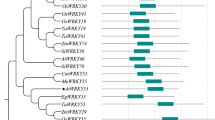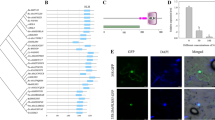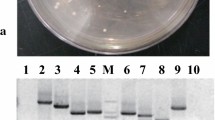Abstract
The WRKY transcription factor family is involved in responding to biotic and abiotic stresses. Its members contain a typical WRKY domain and can regulate plant physiological responses by binding to W-boxes in the promoter regions of downstream target genes. We identified the sweet sorghum SbWRKY50 (Sb09g005700) gene, which encodes a typical class II of the WRKY family protein that localizes to the nucleus and has transcriptional activation activity. The expression of SbWRKY50 in sweet sorghum was reduced by salt stress, and its ectopic expression reduced the salt tolerance of Arabidopsis thaliana plants. Compared with the wild type, the germination rate, root length, biomass and potassium ion content of SbWRKY50 over-expression plants decreased significantly under salt-stress conditions, while the hydrogen peroxide, superoxide anion and sodium ion contents increased. Real-time PCR results showed that the expression levels of AtSOS1, AtHKT1 and genes related to osmotic and oxidative stresses in over-expression strains decreased under salt-stress conditions. Luciferase complementation imaging and yeast one-hybrid assays confirmed that SbWRKY50 could directly bind to the upstream promoter of the SOS1 gene in A. thaliana. However, in sweet sorghum, SbWRKY50 could directly bind to the upstream promoters of SOS1 and HKT1. These results suggest that the new WRKY transcription factor SbWRKY50 participates in plant salt response by controlling ion homeostasis. However, the regulatory mechanisms are different in sweet sorghum and Arabidopsis, which may explain their different salt tolerance levels. The data provide information that can be applied to genetically modifying salt tolerance in different crop varieties.
Key message
(1) Sweet sorghum SbWRKY50 is negatively involved in salt response.
(2) Over-expression of SbWRKY50 in A. thaliana affects plant growth, ROS and the ion contents.
(3) SbWRKY50 could directly bind to the upstream promoter of the SOS1 gene in A. thaliana and the promoter of SOS1 and HKT1 in sweet sorghum.





Similar content being viewed by others
References
Ali MA, Azeem F, Nawaz MA, Acet T, Abbas A, Imran QM, Shah KH (2018) Transcription factors WRKY11 and WRKY17 are involved in abiotic stress responses in, Arabidopsis J Plant Physiol 226:12–21
Almansouri M, Kinet JM, Lutts S (2001) Effect of salt and osmotic stresses on germination in durum wheat (Triticum durum Desf.). Plant Soil 231:243–254
Asano T, Hayashi N, Kobayashi M, Aoki N, Miyao A, Mitsuhara I, Ichikawa H, Komatsu S, Hirochika H, Kikuchi S, Ohsugi R (2012) A rice calcium-dependent protein kinase OsCPK12 oppositely modulates salt-stress tolerance and blast disease resistance. Plant J 69:26–36
Bakshi M, Oelmüller R (2014) WRKY transcription factors: jack of many trades in plants. Plant Signal Behav 9:e27700
Birkenbihl RP, Kracher B, Somssich IE, Ziegler J, Liu S (2015) Negative regulation of ABA signaling by WRKY33 is critical for Arabidopsis immunity towards Botrytis cinerea 2100. e-Life 4:e07295
Cai R, Zhao Y, Wang Y, Lin Y, Cheng B (2014) Overexpression of a maize WRKY58 gene enhances drought and salt tolerance in transgenic rice. Plant Cell Tissue Org 119:565–577
Chen L, Song Y, Li S, Zhang L, Zou C, Yu D (2012) The role of WRKY transcription factors in plant abiotic stresses. Biochim Biophys Acta 1819:120–128
Chen HT, Chen X, Gu HP, Wu BY, Zhang HM, Yuan XX, Cui XY (2014) GmHKT1;4, a novel soybean gene regulating Na+/K+ ratio in roots enhances salt tolerance in transgenic plants. Plant Growth Regul 73:299–308
Diedhiou C, Golldack D (2006) Salt-dependent regulation of chloride channel transcripts in rice. Plant Sci 170:793–800
Ding L, Zhu JK (1997) Reduced Na+ uptake in the NaCl-hypersensitive SOS1 mutant of Arabidopsis thaliana Plant Physiol 113:795–799
Ding ZJ, Yan JY, Li GX, Wu ZC, Zhang SQ, Zheng SJ (2014) WRKY41 controls Arabidopsis seed dormancy via direct regulation of ABI3 transcript levels not downstream of ABA. Plant J 79:810–823
Gao HM, Wang YF, Xu P, Zhang ZB (2018) Overexpression of a wrky transcription factor TaWRKY2 enhances drought stress tolerance in transgenic wheat. Front Plant Sci 9:997
Guo YY, Tian SS, Liu SS, Wang WQ, Sui N (2017) Energy dissipation and antioxidant enzyme system protect photosystem II of sweet sorghum under drought stress. Photosynthetica 56:861–872
Guo YY, Song YS, Zheng HX, Zhang Y, Guo JR, Sui N (2018) NADP-malate dehydrogenase of sweet sorghum improves salt tolerance of Arabidopsis thaliana J Agric Food Chem 66:5992–6002
Han GL, Wang MJ, Yuan F, Sui N, Song J, Wang BS (2014) The CCCH zinc finger protein gene atzfp1 improves salt resistance in Arabidopsis thaliana Plant Mol Biol 86:237–253
Han Y, Fan T, Zhu X, Wu X, Cao S (2019) WRKY12 represses GSH1 expression to negatively regulate cadmium tolerance in Arabidopsis Plant Mol Biol 99:149–159
Hichri I, Muhovski Y, Žižková E, Dobrev PI, Gharbi E, Jose M, Franco-Zorrilla JM, Lopez-Vidriero I, Solano R, Clippe A, Errachid A, Motyka V, Lutts S (2017) The Solanum lycopersicum wrky3 transcription factor slwrky3 is involved in salt stress tolerance in tomato. Front Plant Sci 8:1343
Hu ZM, Yang X, Fromm ME (2006) Activation of the NaCl and drought-induced RD29A and RD29B promoters by constitutively active Arabidopsis MAPKK or MAPK proteins. Plant Cell Environ 29:1761–1770
Ibragimova SM, Trifonova EA, Filipenko EA, Shymny VK (2015) Evaluation of salt tolerance of transgenic tobacco plants bearing the P5CS1 gene of Arabidopsis thaliana Russ J Genet 51:1181–1188
Ishiguro S, Nakamura K (1994) Characterization of a cDNA encoding a novel DNA-binding protein, SPF1, that recognizes SP8 sequences in the 5' upstream regions of genes coding for sporamin and betaamylase from sweet potato. Mol Gen Genet 244:563–571
Jafarzadeh AA, Aliasgharzad N (2007) Salinity and salt composition effects on seed germination and root length of four sugar beet cultivars. Biologia 62:562–564
Jaime-Pérez N, Pineda B, García-Sogo B, Atares A, Athman A, Byrt CS, Belver A (2017) The sodium transporter encoded by the HKT1; 2 gene modulates sodium/potassium homeostasis in tomato shoots under salinity. Plant Cell Environ 40:658–671
Jiang YZ, Guo L, Liu R, Jiao B, Zhao X, Ling ZY, Luo K (2016) Overexpression of poplar ptrwrky89 in transgenic Arabidopsis leads to a reduction of disease resistance by regulating defense-related genes in salicylate- and jasmonate-dependent signaling. PLoS ONE 11:e0149137
Kim KC, Lai Z, Fan B, Chen Z (2008) Arabidopsis WRKY38 and WRKY62 transcription factors interact with histone deacetylase 19 in basal defense. Plant Cell Online 20:2357–2371
Lan A, Huang J, Zhao W, Peng Y, Chen Z, Kang D (2013) A salicylic acid-induced rice (Oryza sativa L.) transcription factor OsWRKY77 is involved in disease resistance of Arabidopsis thaliana Plant Biol 15:452–461
Lee H, Cha J, Choi C, Choi N, Ji HS, Park SR, Lee S, Hwang DJ (2018) Rice WRKY11 plays a role in pathogen defense and drought tolerance. Rice 11:5
Li J, Yan XF, Zu YG (2000) Generation of activated oxygen and change of cell defense enzyme activity in leaves of Korean pine seedling under low temperature. J Integr Plant Biol 42:148–152
Li JG, Pu LJ, Zhu M, Zhang R (2012) The present situation and hot issues in the salt-affected soil research. Acta Geogr Sin 67:1233–1245
Li JG, Pu LJ, Han MF, Zhu M, Zhang RS, Xiang YZ (2014a) Soil salinization research in China: advances and prospects. J Geogr Sci 24:943–960
Li MF, Guo SJ, Xu Y, Meng QW, Li G, Yang XH (2014b) Glycine betaine-mediated potentiation of HSP gene expression involved calcium signaling pathways in tobacco exposed to NaCl stress. Physiol Plant 150:63–75
Li YB, Li T, Han YY, Fan SX (2017) Cloning and function analysis of heat-shock-protein LsHsp70-2711 gene under high temperature stress in leaf lettuce (Lactuca sativa L.). Sci Agric Sin 8:12
Li J, Wang YQ, Yu B, Song QP, Liu Y, Chen THH, Li G, Yang XH (2018) Ectopic expression of StCBF1 and ScCBF1 have different functions in response to freezing and drought stresses in Arabidopsis Plant Sci 270:221–233
Liu W, Li RJ, Han TT, Cai W, Fu ZW, Lu YT (2015) Salt stress reduces root meristem size by nitric oxide-mediated modulation of auxin accumulation and signaling in Arabidopsis Plant Physiol 168:343–356
Liu QN, Liu Y, Xin ZZ, Zhang DZ, Ge BM, Yang RP, Wang ZF, Yang L, Tang BP, Zhou CL (2017a) Genome-wide identification and characterization of the WRKY gene family in potato (Solanum tuberosum). Biochem Syst Ecol 71:212–218
Liu S, Wang WQ, Li M, Wan SB, Sui N (2017b) Antioxidants and unsaturated fatty acids are involved in salt tolerance in peanut. Acta Physiol Plant 39:207
López-Galiano MJ, González-Hernández AI, Crespo-Salvador O, Rausell C, Real MD, Escamilla M, García-Robles I (2018) Epigenetic regulation of the expression of WRKY75 transcription factor in response to biotic and abiotic stresses in Solanaceae plants. Plant Cell Rep 37:167–176
Ma CL (2002) cDNA cloning and gene expression of APX in Suaeda salsa in response to salt stress. Acta Pharmacol Sin 28:261–266
Pedro DV, Mohamed F, Gregorio BE, Lydia F, Cesar P, José AH, Lorenzo B (2013) Ectopic expression of cytosolic superoxide dismutase and ascorbate peroxidase leads to salt stress tolerance in transgenic plums. Plant Biotechnol J 11:976–985
Potschin M, Schlienger S, Bieker S, Zentgraf U (2014) Senescence networking: WRKY18 is an upstream regulator, a downstream target gene, and a protein interaction partner of WRKY53. J Plant Growth Regul 33:106–118
Reginato MA, Castagna A, Furlan A, Castro S, Ranieri A, Luna V (2014) Physiological responses of a halophytic shrub to salt stress by Na2SO4 and NaCl: oxidative damage and the role of polyphenols in antioxidant protection. AoB Plants 6:plu042
Rinerson CI, Rabara RC, Tripathi P, Shen QJ, Rushton PJ (2015) The evolution of WRKY transcription factors. BMC Plant Biol 15:66
Schnippenkoetter W, Lo C, Liu G, Dibley K, Chan WL, White J, Milne R, Zwart A, Kwong E, Keller B, Godwin I, Krattinger S, Lagudah ES (2017) The wheat Lr34 multipathogen resistance gene confers resistance to anthracnose and rust in sorghum. Plant Biotechnol J 15:1387–1396
Shao Q, Han N, Ding TL, Zhou F, Wang BS (2014) SsHKT1;1 is a potassium transporter of the C3 halophyte Suaeda salsa that is involved in salt tolerance. Funct Plant Biol 41:790
Shi H, Quintero FJ, Pardo JM, Zhu JK (2002) The putative plasma membrane Na/H antiporter sos1 controls long-distance Na+ transport in plants. Plant Cell 14:465–477
Shi H, Lee BH, Wu SJ, Zhu JK (2003) Overexpression of a plasma membrane Na+/H+ antiporter gene improves salt tolerance in Arabidopsis thaliana Nat Biotechnol 21:81
Si AJ, Yu Y, Chen H, Tian Q (2017) Functional prediction of stress response GhWRKY2 gene in cotton (Gossypium hirsutum). J Agric Biotechnol 25:222–230
Song YS, Li JL, Liu ML, Meng Z, Liu KC, Sui N (2019) The role of nitrogen on maize seedlings under drought stress. Funct Plant Biol 46:350–359
Sui N, Yang Z, Liu ML, Wang BS (2015) Identification and transcriptomic profiling of genes involved in increasing sugar content during salt stress in sweet sorghum leaves. BMC Genomics 16:534
Sui N, Tian SS, Wang WQ, Wang MJ, Fan H (2017) Overexpression of glycerol-3-phosphate acyltransferase from Suaeda salsa improves salt tolerance in Arabidopsis Front Plant Sci 8:1337
Sui N, Wang Y, Liu SS, Yang Z, Wang F, Wan SB (2018) Transcriptomic and physiological evidence for the relationship between unsaturated fatty acid and salt stress in peanut. Front Plant Sci 9:1–12
Sun C, Palmqvist S, Olsson H, Mats Borén Ahlandsberg S, Jansson C (2003) A novel WRKY transcription factor, SUSIBA2, participates in sugar signaling in barley by binding to the sugar-responsive elements of the iso1 promoter. Plant Cell 15:2076–2092
Syvertsen JP, Garcia-Sanchez F (2014) Multiple abiotic stresses occurring with salinity stress in citrus. Environ Exp Bot 103:128–137
Szekely G, Abraham E, Cseplo A, Rigo G, Zsigmond L, Csisza J, Ayaydin F, Strizhov N, Jasik J, Schmelzer E, Koncz C, Szabados L (2008) Duplicated P5CS genes of Arabidopsis play distinct roles in stress regulation and developmental control of proline biosynthesis. Plant J 53:18
Tian XJ, Li XF, Zhou WJ, Ren YK, Wang ZY, Liu ZQ, Tang JQ, Tong HN, Fang J, Bu QY (2017) Transcription factor OsWRKY53 positively regulates brassinosteroid signaling and plant architecture. Plant Physiol 175:1337–1349
Ülker B, Mukhtar MS, Somssich IE (2007) The WRKY70 transcription factor of Arabidopsis influences both the plant senescence and defense signaling pathways. Planta 226:125–137
Wang Y, Ying Y, Chen J, Wang X (2004) Transgenic Arabidopsis overexpressing Mn–SOD enhanced salt-tolerance. Plant Sci 167:671–677
Wang F, Chen HW, Li QT, Wei W, Li W, Zhang WK, Ma B, Bi YD, Lai YC, Liu XL, Man WQ, Zhang JS, Chen SY (2015) GmWRKY27 interacts with GmMYB174 to reduce expression of GmNAC29 for stress tolerance in soybean plants. Plant J 83:224–236
Wang L, Zhang XL, Wang L, Tian Y, Jia N, Chen S, Shi NB, Huang XM, Zhou C, Yu YW, Zhang ZQ, Pang XQ (2017) Regulation of ethylene-responsive SlWRKYs involved in color change during tomato fruit ripening. Sci Rep 7:16674
Wei DD, Cheng D, Liu WB, Liu T, Yang XH, Zheng YH (2015) Adequate potassium application enhances salt tolerance of moderate-halophyte Sophora alopecuroides Plant Soil Environ 61:364–370
Wei DD, Zhang W, Wang CC, Meng QW, Li G, Chen TH, Yang XH (2017) Genetic engineering of the biosynthesis of glycine betaine leads to alleviate salt-induced potassium efflux and enhances salt tolerance in tomato plants. Plant Sci 257:74–83
Wu SJ, Ding L, Zhu JK (1996) SOS1, a genetic locus essential for salt tolerance and potassium acquisition. Plant Cell 8:617–627
Wu H, Shabala L, Zhou M, Shabala S (2014) Durum and bread wheat differ in their ability to retain potassium in leaf mesophyll: implications for salinity stress tolerance. Plant Cell Physiol 55:1749–1762
Xu ZL, Raza Q, Xu L, He XL, Huang YH, Yi JX, Zhang DY, Shao HB, Ma HX, Ali Z (2018a) GmWRKY49, a salt-responsive nuclear protein, improved root length and governed better salinity tolerance in transgenic Arabidopsis Front Plant Sci 9:809
Xu Z, Raza Q, Xu L, He X, Huang Y, Yi J, Zhang D, Shao HB, Ma H, Ali Z (2018b) GmWRKY49, a salt-responsive nuclear protein, improved root length and governed better salinity tolerance in transgenic Arabidopsis Front Plant Sci 9:809
Yang Q, Chen ZZ, Zhou XF, Yin HB, Li X, Xin XF, Gong Z (2009) Overexpression of SOS (salt overly sensitive) genes increases salt tolerance in transgenic Arabidopsis Mol Plant 2:22–31
Yang Y, Chi Y, Wang Z, Zhou Y, Fan B, Chen Z (2016) Functional analysis of structurally related soybean GmWRKY58 and GmWRKY76 in plant growth and development. J Exp Bot 67:4727–4742
Yang Z, Wang Y, Wei XC, Zhao X, Wang BS, Sui N (2017) Transcription profiles of genes related to hormonal regulations under salt stress in sweet sorghum. Plant Mol Biol Rep 35:1–14
Yang Z, Zheng HX, Wei XC, Song J, Wang BS, Sui N (2018) Transcriptome analysis of sweet sorghum inbred lines differing in salt tolerance provides novel insights into salt exclusion by roots. Plant Soil 430:423–439
You LL, Song QP, Wu YY, Li SC, Jiang CM, Chang L, Yang XH, Zhang J (2019) Accumulation of glycine betaine in transplastomic potato plants expressing choline oxidase confers improved drought tolerance. Planta 249:1963–1975
Yue Y, Zhang M, Zhang J, Duan L, Li Z (2012) SOS1 gene overexpression increased salt tolerance in transgenic tobacco by maintaining a higher K+/Na+ ratio. J Plant Physiol 169:255–261
Zhang T, Tan D, Zhang L, Zhang X, Han Z (2017) Phylogenetic analysis and drought-responsive expression profiles of the wrky transcription factor family in maize. Agri Gene 3:99–108
Zhao D, Zhao JR, Huang X, Li N, Liu Y, Huang ZJ, Zhang ZY (2011) Functional analysis of TNBL1 gene in wheat defense response to barley yellow dwarf virus using BSMV-VIGS technique. J Crops 37:2106–2110
Zhao X, Wei P, Liu Z, Yu B, Shi H (2017) Soybean Na+/H+ antiporter GmsSOS1 enhances antioxidant enzyme activity and reduces Na+ accumulation in Arabidopsis and yeast cells under salt stress. Acta Physiol Plant 39:19
Zheng LY, Guo XS, He B, Sun L, Peng Y, Dong S, Liu T, Jiang S, Ramachandran S, Liu C, Jing H (2011) Genome-wide patterns of genetic variation in sweet and grain sorghum (Sorghum bicolor). Genome Biol 12:R114
Zhou QY (2008) Soybean WRKY-type transcription factor genes, GmWRKY13, GmWRKY 21, and GmWRKY 54, confer differential tolerance to abiotic stresses in transgenic Arabidopsis plants. Plant Biotechnol J 6:486–503
Zhou L, Wang N, Gong S, Lu R, Li Y, Li X (2015) Overexpression of a cotton (Gossypium hirsutum) WRKY gene, GhWRKY34, in Arabidopsis enhances salt-tolerance of the transgenic plants. Plant Physiol Biochem 96:311–320
Zou X, Seemann JR, Neuman D, Shen QJ (2004) A WRKY gene from creosote bush encodes an activator of the abscisic acid signaling pathway. J Biol Chem 279:55770–55779
Acknowledgements
We are grateful for financial support from the National Natural Science Research Foundation of China (31871538), the National Key R&D Program of China (2018YFD1000700, 2018YFD1000704), the Major Program of Shandong Provincial Natural Science Foundation (2017C03), the Opening Foundation of Shandong Provincial Key Laboratory of Crop Genetic Improvement, Ecology and Physiology (SDKL2018008-3). We thank Lesley Benyon, PhD, from Liwen Bianji, Edanz Group China (www.liwenbianji.cn/ac), for editing the English text of a draft of this manuscript.
Author information
Authors and Affiliations
Contributions
Yushuang Song, Jinlu Li and Yi Sui imitated the manuscript. Yushuang Song and Jinlu Li performed experiments; Yushuang Song, Guoliang Han, Yi Zhang and Shangjing Guo collected data and carried out all analyses; Na Sui and Yi Sui conceptualized the idea and revised the manuscript. All authors read and approved the final manuscript.
Corresponding author
Ethics declarations
Conflict of interest
The authors declare no conflict of interest.
Electronic supplementary material
Below is the link to the electronic supplementary material.
11103_2020_966_MOESM1_ESM.tif
Supplementary material 1 Fig. S1 Bioinformatics analysis of SbWRKY50. A Protein sequence analysis of SbWRKY50. B Structural domain analysis of SbWRKY50. C and D Homologous sequence alignment (C) and evolutionary analysis (D) of SbWRKY50 (AtArabidopsis thaliana, BeBambusa emeiensis, DoDichanthelium oligosanthes, LpLolium perenne, SiSetaria italica, ZmZea mays, ObOryza brachyantha, TaTriticum aestivum, TuTriticum urartu) (TIF 1225 kb)
11103_2020_966_MOESM2_ESM.docx
Supplementary material 2 Table S1 Number of W-boxes in promoters of genes. Table S2 Primers for amplification and qPCR gene expression analysis (DOCX 16 kb)
Rights and permissions
About this article
Cite this article
Song, Y., Li, J., Sui, Y. et al. The sweet sorghum SbWRKY50 is negatively involved in salt response by regulating ion homeostasis. Plant Mol Biol 102, 603–614 (2020). https://doi.org/10.1007/s11103-020-00966-4
Received:
Accepted:
Published:
Issue Date:
DOI: https://doi.org/10.1007/s11103-020-00966-4




